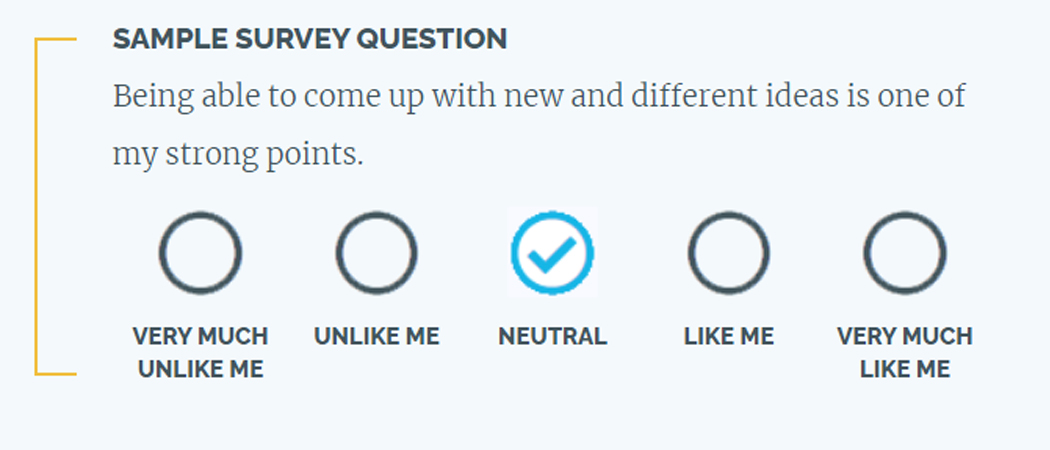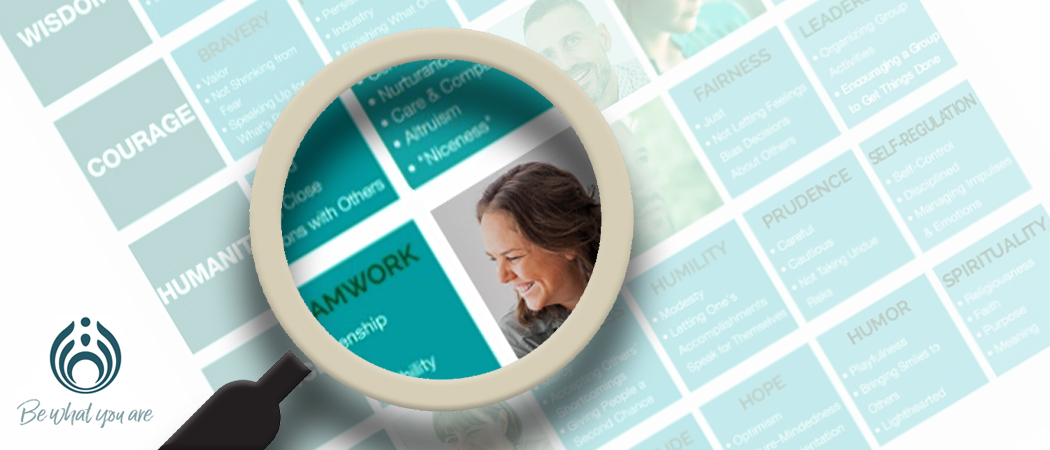We all need evidence-based, practical strategies that when employed ensure that we flourish personally and professionally. The VIA Character Strengths Survey is directly linked to the fundamentals of Positive Psychology, which makes it a perfect place to start.
Enablers of positive change
Researchers have recently identified seven personal factors, which can move us from surviving to fully thriving. They include:
- A positive perspective
- Religiosity or spiritual connection
- A pro-active personality
- Self-motivation
- A desire for knowledge and learning
- Psychological resilience
- Social competence and self-awareness
What exactly are character strengths?
Character strengths reflect the “real” you—who you are at your core, your innate traits. Every individual possesses different degrees of all 24-character strengths, giving them a unique character strengths profile.
How do you discover your TOP 5 strengths?
By undertaking the VIA Character Strengths Survey is the only free, scientific survey of character strengths in the world. This simple test takes 10 minutes to complete and reliably supplies a 24 personal character strengths profile, which identifies your top 5-character strengths.

How will identifying your strengths help you to develop the 7 enablers of thriving?
Once you begin to understand your own top strengths, and how this can benefit you personally, you can develop another, more complex, layer of understanding by learning to identify and understand other people’s unique strengths. This will enable you to consciously leverage your character strengths to support positive personal growth.
How does this look in more detail?
- A positive perspective – I see the good in the future.
A knowledge of your personal character strengths, and how they are interwoven between people, supports hopeful future expectations, an optimistic attitude, and positive views of your future.
- Religiosity or spiritual connection – I am connected with the universe in a meaningful way.
Many character strengths can be causally related to engaging skilfully with your preferred religious or spiritual beliefs. Maybe you possess the Character Strengths of spirituality, perspective, curiosity, or love, which align directly to this enabler.
- A pro-active personality – I try to challenge myself.
The use of signature strengths has been correlated to individuals making greater progress on their goals. Their ability to sense what is going on within themself and others, supports positive cooperation and connection.
- Self-motivation – I am motivated to grow.
Research shows people are motivated by their naturally occurring strengths, talents, and interests. These serve to energise and fuel a person’s interest, meaning, purpose, growth, and learning.
- A desire for knowledge and learning – I learn, therefore I know.
Research shows the desire and commitment to learning is important to thriving not just for certain people but across groups of people. Purpose through learning can act to buffer people from vulnerabilities that can lead to depression and anxiety.
- Psychological resilience – I overcome, rise up, and benefit from my struggles.
When stress and adversity arise, those who thrive are able to be flexible and adaptable and even benefit from the problem. For example, extra workloads, colleague difficulties, or new demands become ‘not to overcome or ride out’ but to benefit from.
- Social competence – It matters that I connect with others.
Recognition and appreciation of a partner’s, or another person’s, character strengths is directly correlated to better relationships. The strength of social intelligence helps us assess situations and people, which results in responding appropriately.
Strengths spotting – introduce a new vocabulary
It is too easy at times to judge people’s actions according to our own perspective, which can result in significant relationships being negatively affected.
Developing your vocabulary to think about strengths is a wonderful first step, yet if you struggle to initially understand how character strengths relate to people’s actions, this language is unlikely to benefit you in terms of initially realising the enablers. Identifying role-models can be a useful way of coming up with behaviours associated with specific strengths. For example, you may consider someone like Nelson Mandela to represent the character strength of forgiveness, whilst considering a list of actions which he did to suggest he possessed this strength. You could get into the practice of asking questions like – What would a person who is very kind (kindness) do and say, in a specific situation?
Try this: When you next watch a movie, focus on identifying 3-character strengths you can spot in the characters. For example, Forest Gump demonstrates the character strengths of bravery, honesty and love…in fact he pretty much demonstrates high levels of all 24-character strengths, which is why people find him to be such an amazing character.
Can you overplay or underplay your TOP 5 strengths?
YES and YES!!
Underplaying your strengths can leave your feeling flat as you may tend to unintentionally, or you’re compelled to, focus on priorities that drain your enthusiasm. Do you tend to recover quickly from energy sapping daily events? Using your strengths in mini breaks can energise you. For example: taking 15 minutes out to go for a walk to observe the beauty around you (out of the office or home) – if one of your strengths in appreciation of beauty, can dramatically change your application when you return to your original environment.
Overplaying your strengths has been likened to using one tool to fix everything around the house. Michelle McQuaid suggests that this would inevitably result in ‘holes where you didn’t want them’. This is true of your character strengths as well; you don’t want to apply your strengths like they’re a blunt instrument. Rather, choose the appropriate strength and use it appropriately in the right context.
Take the first step to identify, and benefit from, your TOP 5 strengths!
At Get Mentally Fit, our Programs and Services are informed by the fundamental concept of positive psychology. We also highly value identifying a client’s character strengths, which allows us to skillfully support them to realise the positive change they identify as their focus. Having facilities to establish and sustain a dialogue around character strengths affords us the luxury of customising our Strengths Circuit program.
Contact us to enquire into undertaking the pro-active step of reliably measuring, and skilfully enhancing, your current mental fitness.


